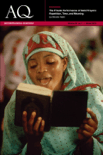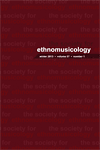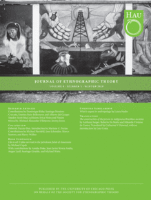
Studia Ethnologica Croatica
Scope & Guideline
Pioneering Open Access to Cultural Understanding
Introduction
Aims and Scopes
- Cultural Anthropology and Ethnography:
The journal publishes research that explores cultural practices, identities, and social dynamics of various communities, often through ethnographic studies that provide deep insights into local customs and traditions. - Interdisciplinary Approaches:
There is a strong emphasis on integrating methods and perspectives from various disciplines, such as sociology, history, and political science, to enrich ethnological research and address complex social issues. - Impact of Modernization and Globalization:
Studies often focus on how modernization and globalization affect local cultures, identities, and social structures, examining the interplay between global influences and local traditions. - Social Issues and Marginality:
The journal highlights themes related to social exclusion, discrimination, and the experiences of marginalized groups, providing a platform for voices that are often overlooked in mainstream discourse. - Cultural Heritage and Memory:
Research on intangible cultural heritage, social memory, and the significance of cultural practices in maintaining identity is a key focus, reflecting the journal's commitment to preserving and understanding cultural narratives.
Trending and Emerging
- Entrepreneurship and Economic Anthropology:
There is a growing interest in exploring entrepreneurship, particularly among youth and marginalized groups, as a lens to understand economic practices and social identities in the modern context. - Social Inclusion and Exclusion:
Research addressing social inclusion and exclusion, especially in relation to sports, urbanization, and the experiences of minorities, has become increasingly prominent, reflecting contemporary societal challenges. - Digital Humanities and Cultural Heritage:
The intersection of digital technologies with cultural heritage studies is emerging as a significant theme, showcasing how digital methods can enhance the understanding and preservation of intangible cultural heritage. - Cultural Memory and Identity Politics:
Studies focusing on cultural memory, identity politics, and the negotiation of identities in post-conflict societies are gaining traction, indicating a shift towards addressing complex narratives of belonging and historical memory. - Impact of Globalization on Local Cultures:
Research that examines the effects of globalization on local cultural practices and identities is increasingly relevant, highlighting how global forces reshape local realities.
Declining or Waning
- Traditional Ethnological Studies:
There has been a noticeable decline in traditional ethnological studies that focus solely on rural or historical practices. As contemporary issues gain prominence, the emphasis on historical ethnography appears to be waning. - Static Cultural Models:
Research relying on static models of culture and identity is less frequently published. The journal has shifted towards dynamic interpretations that consider the fluidity of cultural identities in modern contexts. - Narrowed Focus on Localized Issues:
While local issues remain important, there is a decreasing emphasis on localized ethnographic studies without broader contextualization. The journal is increasingly prioritizing research that connects local phenomena to global trends. - Over-representation of Photography and Visual Culture:
The thematic focus on photography and visual culture, while significant, has seen a reduction as the journal diversifies its content to include a wider array of methodologies and subjects.
Similar Journals

Novye Issledovaniya Tuvy-New Research of Tuva
Exploring the Rich Tapestry of Tuva's HeritageNovye Issledovaniya Tuvy-New Research of Tuva is a prominent open-access journal published by CH K LAMAZHAA since 2009, dedicated to advancing the fields of Anthropology, Cultural Studies, and History. With an impressive Q1 ranking in these disciplines and a robust presence in the Scopus database—ranking 65th in History and achieving a 96th percentile in Anthropology—it serves as an essential platform for researchers and scholars seeking to explore and disseminate new insights regarding the diverse cultural heritage and historical context of the Tuva region in the Russian Federation. The journal is committed to providing accessible, high-quality research, ensuring that vital information reaches a wide audience without barriers. By spanning the years 2016 to 2024, Novye Issledovaniya Tuvy not only reflects contemporary developments but also contributes significantly to the global discourse on cultural identity and historical narratives.

ANTHROPOS
Advancing scholarship in the heart of cultural exploration.ANTHROPOS is a distinguished journal published by NOMOS VERLAGSGESELLSCHAFT MBH & CO KG, anchoring its academic presence in Switzerland since its inception in 1983. With a commitment to advancing the fields of Anthropology and Arts and Humanities, this peer-reviewed publication serves as a vital platform for scholarly research, providing critical insights and fostering dialogue among researchers, professionals, and students alike. ANTHROPOS is categorized in Q3 for both Anthropology and the broader Arts and Humanities domains as of 2023, indicating its reputable yet emerging presence within these disciplines. Despite its significant contributions, the journal currently does not feature open access options, urging readers to engage through traditional academic channels. By embracing interdisciplinary approaches and contemporary issues, ANTHROPOS aims to illuminate complex cultural phenomena, making it an essential resource for anyone dedicated to understanding the intricacies of human societies.

ANTHROPOLOGICAL QUARTERLY
Exploring the Depths of Human ExperienceANTHROPOLOGICAL QUARTERLY, published by the George Washington University Institute of Ethnographic Research, stands as a vital resource in the field of anthropology and broader arts and humanities studies. With an ISSN of 0003-5491 and an E-ISSN of 1534-1518, this esteemed journal has been contributing to academic discourse since its establishment in 1981. The journal holds a respected position in both the Q2 category for Anthropology and the Q2 category for Arts and Humanities (miscellaneous), demonstrating its impact and relevance, as evidenced by its rank of #152 out of 502 in the Social Sciences sector for anthropology and rank of #179 out of 552 in the Arts and Humanities field. Researchers, professionals, and students can rely on ANTHROPOLOGICAL QUARTERLY for rigorous peer-reviewed articles that push the boundaries of ethnographic research and anthropological theory, addressing contemporary issues with scholarly precision. The journal’s commitment to fostering critical analysis and interdisciplinary perspectives establishes it as an essential platform for advancing knowledge within its diverse and dynamic field.

Slovensky Narodopis-Slovak Ethnology
Unveiling Ethnological Insights from SlovakiaSlovensky Narodopis-Slovak Ethnology is a leading academic journal dedicated to the exploration of ethnology and cultural studies, published by the Slovak Academy of Sciences at the Institute of Ethnology. With an Open Access policy since 2013, it strives to make high-quality research readily accessible to a global audience, enhancing the dialogue around Slovak cultural heritage and broader anthropological topics. The journal holds a notable position in the field, currently ranked Q2 in anthropology for 2023, indicating its substantial contribution to the discipline. It is indexed in Scopus, with a current rank of 245 out of 502 in the Social Sciences category, reflecting its value within the academic community. Researchers and students alike can look forward to a rich array of original research articles, reviews, and essays that not only delve into Slovak ethnology but also engage with international perspectives, thereby enriching the understanding of cultural dynamics and practices.

Anthropological Notebooks
Empowering Scholars to Share Transformative ResearchAnthropological Notebooks, published by the SLOVENE ANTHROPOLOGICAL SOC, is a noteworthy journal within the field of anthropology. Established in Slovenia, this journal aims to provide a platform for scholarly dialogue and dissemination of anthropological research, fostering interdisciplinary approaches and global perspectives. Although it currently holds a Q4 quartile ranking in anthropology and ranks #421 out of 502 in Scopus, it serves as an essential conduit for emerging voices and innovative ideas in the discipline. Covering research published from 2010 to 2019 and from 2021 to 2024, the journal invites contributions that explore diverse cultural narratives and anthropological insights. Despite its limited open access options, Anthropological Notebooks remains a crucial resource for researchers, professionals, and students seeking to engage with contemporary anthropological discourse and enrich their understanding of human societies.

ETHNOMUSICOLOGY
Charting New Territories in Music and CultureETHNOMUSICOLOGY, published by SOC ETHNOMUSICOLOGY INC, is a premier journal that stands at the intersection of music, anthropology, and cultural studies. With an ISSN of 0014-1836 and an E-ISSN of 2156-7417, this journal has made significant contributions to the field since its inception in 2002, and continues to engage with contemporary issues through to 2024. ETHNOMUSICOLOGY is indexed in esteemed databases and ranks impressively in its respective categories, including Q2 in Cultural Studies and Music, and Q3 in Anthropology for the year 2023. Its Scopus rankings reflect its robust academic impact, placing it in the 79th percentile for Music within the Arts and Humanities, and 78th in Cultural Studies. The journal provides a vital platform for the dissemination of innovative research and fosters scholarly dialogue among researchers, professionals, and students interested in understanding the complex relationships between music and culture across the globe.

HAU-Journal of Ethnographic Theory
Unveiling the Complexity of Cultures through Rigorous Ethnographic Theory.HAU-Journal of Ethnographic Theory, published by University of Chicago Press, stands as a leading platform for scholarly discourse in the field of anthropology. Established in 2011, this esteemed journal focuses on ethnographic methodologies and theoretical advancements, offering a significant contribution to the understanding of human cultures and social practices. With an impressive Q2 ranking in anthropology and a strong placement in the 63rd percentile among peers in the Scopus rankings, HAU ensures high visibility and impact within the academic community. Although the journal currently does not offer open access, it is widely available for institutions, fostering a global dialogue among researchers, professionals, and students. As it converges its content towards 2024, HAU remains dedicated to publishing innovative research that challenges existing paradigms and encourages critical reflection, solidifying its importance in the continuous evolution of ethnographic theory.

Ethnologies
Illuminating the Rich Tapestry of CultureEthnologies is a peer-reviewed academic journal published by the Folklore Studies Association of Canada, dedicated to advancing the field of ethnology and cultural studies. With its ISSN 1481-5974 and E-ISSN 1708-0401, this journal seeks to bridge the gap between theoretical frameworks and empirical research, promoting interdisciplinary dialogue among scholars and practitioners alike. The journal aims to highlight the rich diversity of human experience and cultural expression, making significant contributions to both academic communities and public understanding. Although currently not an open access publication, Ethnologies is known for its rigorous peer-review process and high-impact research articles. Situated in St. Johns, Newfoundland and Labrador, it serves as a vital resource for researchers, professionals, and students dedicated to exploring the complexities of culture and community in a global context.

Gazeta de Antropologia
Fostering Global Discourse in Anthropology.Gazeta de Antropologia is an esteemed open-access journal dedicated to the field of anthropology, published by the ASOC GRANADINA ANTROPOLOGIA in Spain. Since its inception in 1982, this journal has provided a platform for scholarly research, fostering a global discourse on human cultures and social practices. With an ISSN of 2340-2792, it operates under an open-access model, ensuring that all research is freely accessible to readers worldwide. The journal has been acknowledged in the Scopus Rankings, positioned at #412 out of 502 within the Social Sciences category of anthropology, reflecting its commitment to disseminating high-quality research despite its current Q4 quartile ranking. As it converges its efforts from 2012 to 2024, Gazeta de Antropologia aims to engage researchers, professionals, and students alike, enriching the anthropological landscape through a diverse array of articles that contribute to the understanding of cultural dynamics and social structures.

Journal de la Societe des Americanistes
Exploring the Rich Tapestry of American CulturesJournal de la Societe des Americanistes, published by UNIV PARIS X PARIS-NANTERRE, ARCHEOLOGIE & ETHNOLOGIE, is a distinguished platform for the dissemination of scholarly research in the fields of anthropology and cultural studies. With an ISSN of 0037-9174 and an E-ISSN of 1957-7842, this Open Access journal has been making academic content freely accessible since 2016, fostering a global dialogue among researchers and practitioners. Based in France, this journal prioritizes interdisciplinary discourse, enhancing the understanding of cultural dynamics and ethnic diversity across the Americas. Although currently ranked in the Q4 quartile for anthropology and cultural studies, its commitment to rigorous peer-reviewed research places it in a unique position to contribute to the academic landscape. Researchers, professionals, and students seeking to explore intricate cultural themes and anthropological perspectives will find the Journal de la Societe des Americanistes an invaluable resource for their scholarly endeavors.